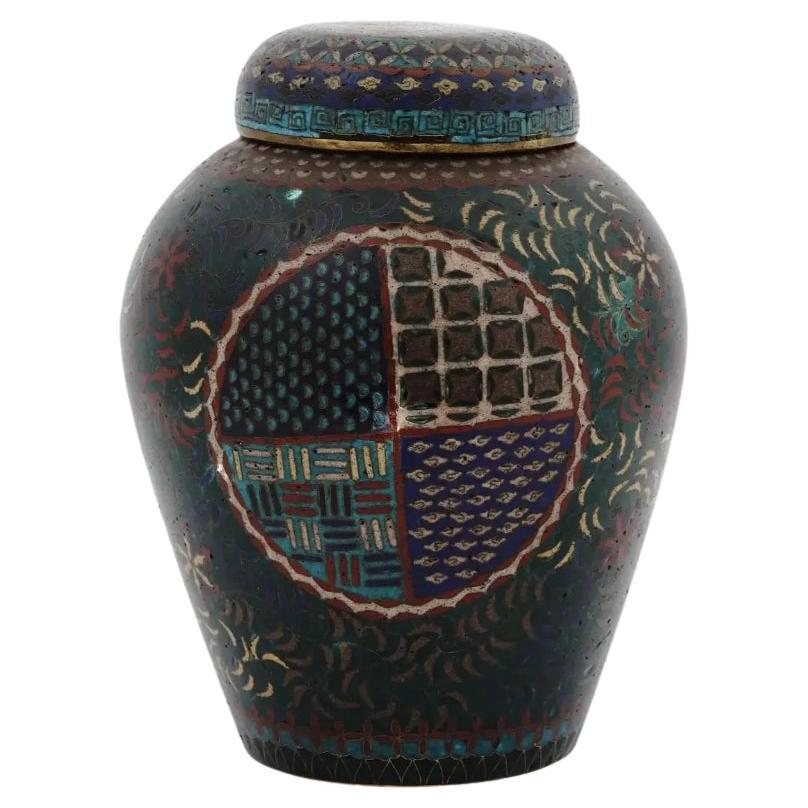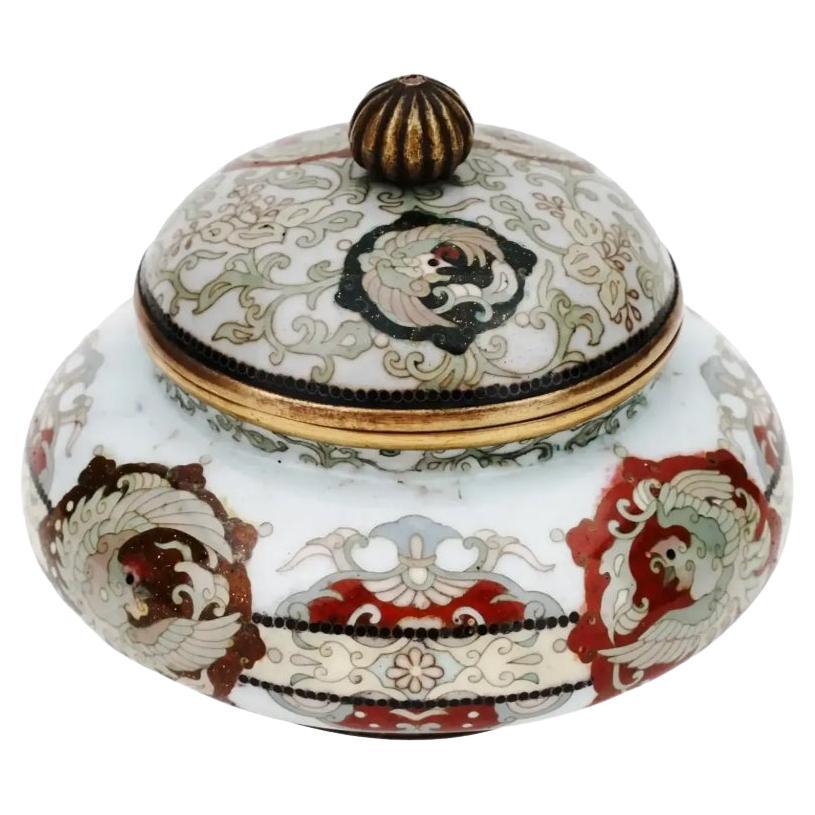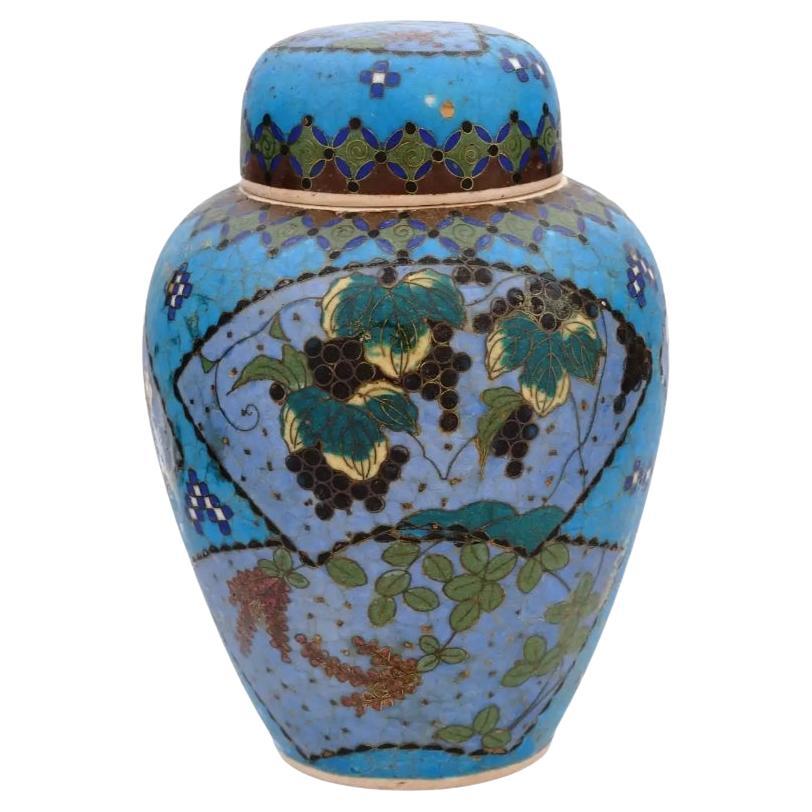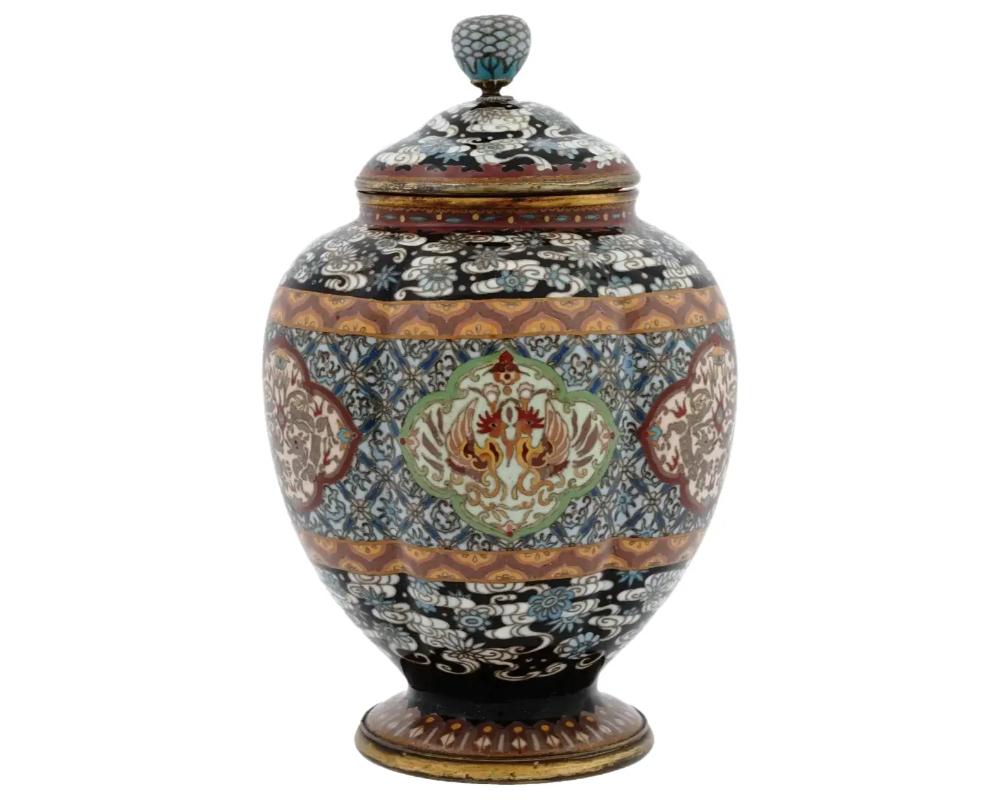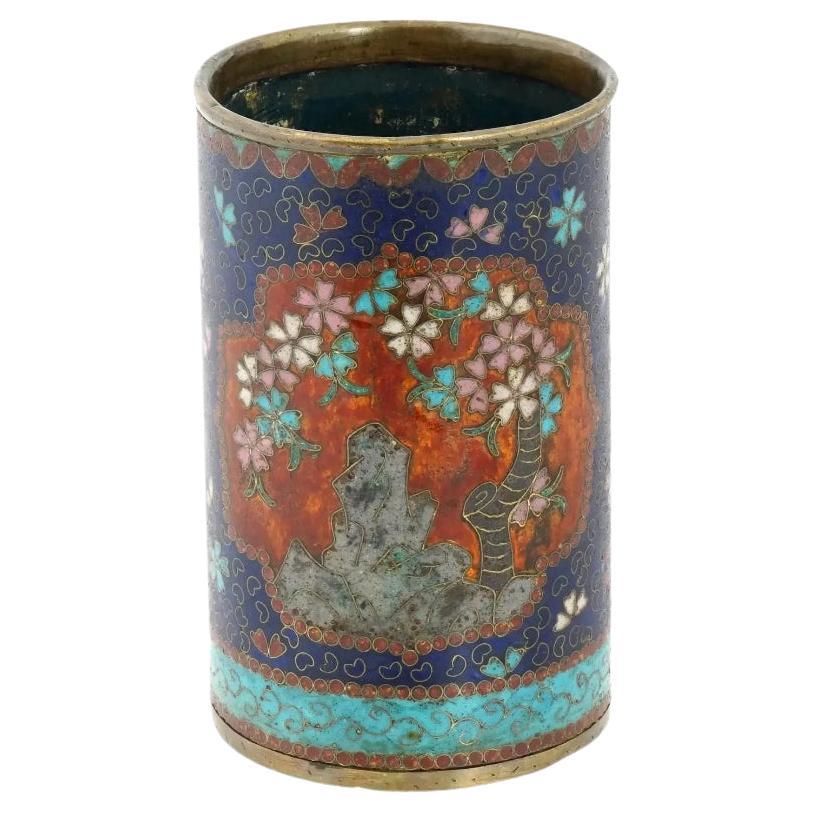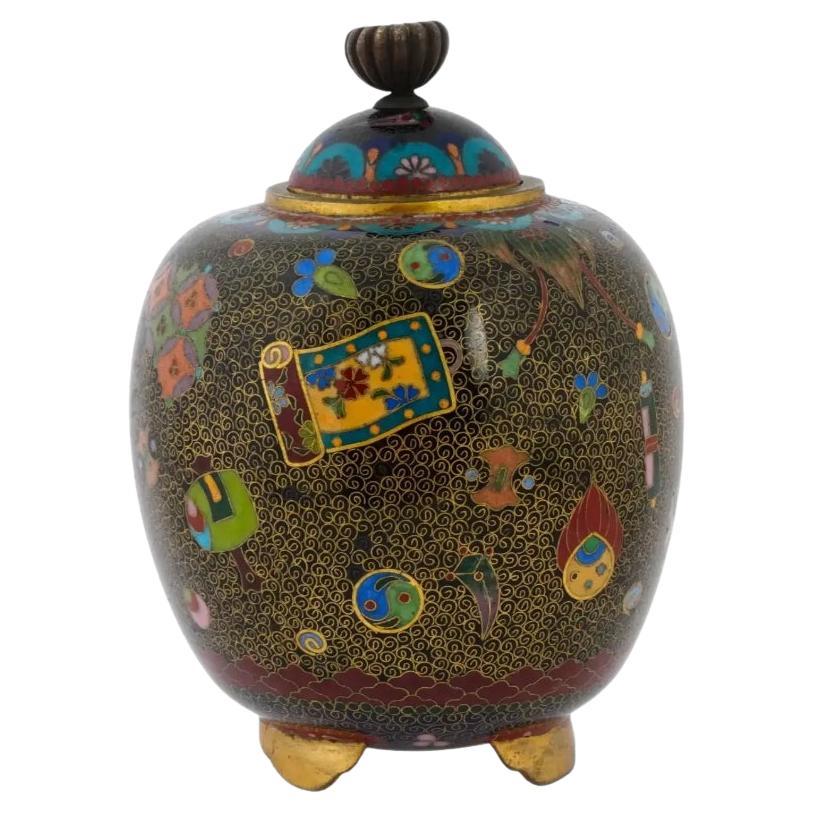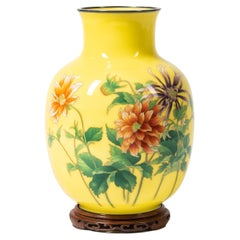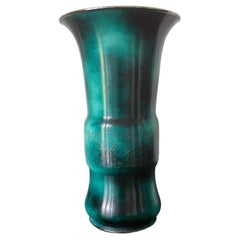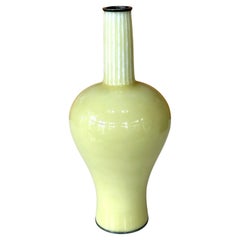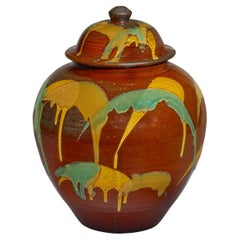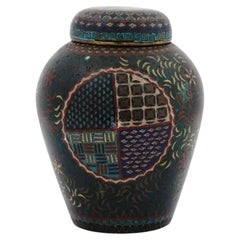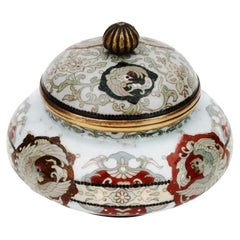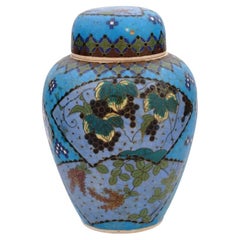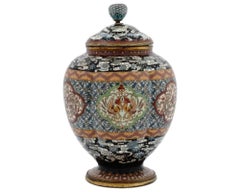Items Similar to Japanese Cloisonné Covered Jar by Ando Jubei
Want more images or videos?
Request additional images or videos from the seller
1 of 11
Japanese Cloisonné Covered Jar by Ando Jubei
$4,200
£3,174.68
€3,648.27
CA$5,848.47
A$6,506.19
CHF 3,410.63
MX$79,504.03
NOK 43,430.06
SEK 40,883.39
DKK 27,232.96
Shipping
Retrieving quote...The 1stDibs Promise:
Authenticity Guarantee,
Money-Back Guarantee,
24-Hour Cancellation
About the Item
Japanese cloisonné enamels are known as shippo-yaki and the mid-19th century saw the production of very high quality wares in the early centers Nagoya. One of the most renowned workshops was the Ando Cloisonné Company, founded by Ando Jubei (1876-1953). The cloisonné work from the workshop was considered the finest during the Meiji Period (1868-1912).
This cloisonné covered box is of a very intriguing color, form and design, likely made to use as a tea caddy during Chado ceremony. The surface is of a brilliant and unusual aubergine color. It is sparsely but superbly decorated with a cloud-like abstract pattern by using a network of small individual wire cells filled with multicolored enamels. To create the subtle palette of colors that appears optically drifting, misty, and translucent, great care was taken to control and balance the placement and the application of the wired cells and enamels. The result is a very poetic piece of art work that invites a visual meditation. The jar was fitted with sterling silver lips and foot ring (stamped as pure silver in Kanji) and marked with Ando cipher logo.
Based on the production style, we date the piece to 1910-1920s, the Taisho Period (1912-1926). Purportedly purchased from Christie's in 1980s.
- Creator:Ando Jubei (Maker)
- Dimensions:Height: 5.75 in (14.61 cm)Diameter: 3 in (7.62 cm)
- Style:Japonisme (Of the Period)
- Materials and Techniques:
- Place of Origin:
- Period:
- Date of Manufacture:1910s-1930s
- Condition:Wear consistent with age and use. Very minor wear.
- Seller Location:Atlanta, GA
- Reference Number:1stDibs: LU945013689141
About the Seller
4.9
Platinum Seller
Premium sellers with a 4.7+ rating and 24-hour response times
Established in 2006
1stDibs seller since 2010
564 sales on 1stDibs
Typical response time: <1 hour
- ShippingRetrieving quote...Shipping from: Atlanta, GA
- Return Policy
Authenticity Guarantee
In the unlikely event there’s an issue with an item’s authenticity, contact us within 1 year for a full refund. DetailsMoney-Back Guarantee
If your item is not as described, is damaged in transit, or does not arrive, contact us within 7 days for a full refund. Details24-Hour Cancellation
You have a 24-hour grace period in which to reconsider your purchase, with no questions asked.Vetted Professional Sellers
Our world-class sellers must adhere to strict standards for service and quality, maintaining the integrity of our listings.Price-Match Guarantee
If you find that a seller listed the same item for a lower price elsewhere, we’ll match it.Trusted Global Delivery
Our best-in-class carrier network provides specialized shipping options worldwide, including custom delivery.More From This Seller
View AllJapanese Cloisonné Vase Ando Jubei with Storage Box
By Ando Jubei
Located in Atlanta, GA
A beautifully decorated cloisonné vase with silver rims by Ando Jubei (1876-1956), the celebrated Japanese Shippo studio. The piece is dated to late Meiji to early Showa period circa...
Category
Early 20th Century Japanese Japonisme Metalwork
Materials
Metal, Silver, Enamel
Japanese Cloisonne Vase with Silver Inlays by Ando Jubei
By Ando Jubei
Located in Atlanta, GA
A Japanese cloisonne vase by Ando Company circa 1910-30s, end of Meiji to Tasho period. The vase takes an archaic Chinese bronze vessel form know...
Category
Vintage 1920s Japanese Meiji Metalwork
Materials
Metal, Silver
Japanese Wireless Musen Cloisonne Vase by Ando Jubei
By Ando Jubei
Located in Atlanta, GA
A Japanese cloisonne vase in bottle-form made by Ando Jubei (1876-1963) circa 1910-20s (late Meiji to Taisho period). The vase features a completely smooth surface without showing any wire. The technique is known as Musen (hidden wire) in Japanese and was notoriously difficult to perfect, especially with piece like this with a relatively large continuous surface. The beguiling effect is to use enamel to mimic porcelain or even jade. This vase, with its ultra smooth surface and soft yellow color (Yellow was often associated with Japanese imperial household...
Category
Early 20th Century Japanese Meiji Metalwork
Materials
Silver, Enamel
Japanese Ceramic Jar with Expressive Glaze Onda Yaki
By Onda Yaki
Located in Atlanta, GA
A Japanese lidded ceramic jar from the kiln of Onda Yaki, circa 2007. The stoneware jar impresses the viewer with a robust bulbous form. and exuberantly splashed and dripped glaze in...
Category
Early 2000s Japanese Organic Modern Ceramics
Materials
Ceramic
Rare Antique Japanese Ceramic Takatori Ware Hoso Mizusashi
Located in Atlanta, GA
This small ceramic container from Edo period Japan circa 1800s was made in the Takatori Kilns in Fukuoka Prefecture. This type of small, tall jar with a lid was specifically created ...
Category
Antique 19th Century Japanese Edo Ceramics
Materials
Ceramic
Large Japanese Contemporary Ceramic Jar from Onda Yaki Kiln
By Onda Yaki
Located in Atlanta, GA
A large Japanese lidded ceramic jar from the kiln of Onda Yaki, circa 2010. The stoneware jar impresses the viewer with a robust bulbous form. Its black body is nearly unglazed but exuberantly splashed with strokes of slip glazes of white, yellow and blue. The visual effect is wonderful that it appears traditional and contemporary at the same time. The tri-color glaze calls to mind the San-Cai from Chinese Tang dynasty, yet the application is akin to abstract painting on canvas.
Onda Yaki also spelled as Onta Yaki also spelled Onta, is a type of Japanese pottery produced in and around the village of Onta in Oita Prefecture in Kyushu Island. It was founded in 1705. Closely associated with Mingei folk art, Onda ware was inscribed by the national government in 1995 as an Intangible Cultural Property
Background from Pucker Gallery where the jar was exibited and purchased.
"In his search for true folk pottery, the Japanese philosopher Soetsu Yanagi...
Category
2010s Japanese Organic Modern Ceramics
Materials
Ceramic
You May Also Like
Antique Japanese Edo Period Cloisonne Enamel Jar
Located in Long Island City, NY
A antique Japanese late Edo Period lidded enamel jar. The jar has a globular shaped body. The exterior of the vase is adorned with medallions ...
Category
Antique 15th Century and Earlier Japanese Edo Jars
Materials
Enamel
Antique Japanese Meiji Period Round Cloisonne Covered Jar
Located in Long Island City, NY
An antique Japanese Meiji period round cloisonne covered jar showcasing the exquisite artistry and craftsmanship of the era. This jar is adorned w...
Category
Early 20th Century Japanese Meiji Jars
Materials
Enamel
$1,000 Sale Price
54% Off
Meiji Japanese Totai Cloisonne Enamel Ceramic Jar
Located in Long Island City, NY
An antique Japanese late Meiji era covered Totai enamel on ceramic ginger jar. Circa: late 19th century to early 20th century. The ware is enameled with a polychrome fan shaped medallions with blossoming flowers, bamboo trees, grapes, surrounded by a geometrical pattern made in the Cloisonne technique. The cover of the ware is decorated with polychrome fan shaped medallions with blossoming flowers. The neck and the lid are adorned with polychrome geometrical, and swirl motifs made in the same technique. Signed with red ink hieroglyphs, on the bottom. Totai Shippo...
Category
Antique Late 19th Century Japanese Meiji Jars
Materials
Enamel
Antique Japanese Cloisonne Enamel Lidded Koro Jar
Located in Long Island City, NY
An antique Japanese cloisonne enamel lidded koro jar from the Meiji period standing on a foot and featuring traditional ornamentations to the center with tw...
Category
Early 20th Century Japanese Meiji Jars
Materials
Enamel
Antique Early Meiji Japanese Cloisonne Brush Pot in the Style of Namikawa
Located in Long Island City, NY
An antique Japanese copper brush pot with cloisonne enamel design. Early Meiji period, after 1868. Cylinder shape. Cherry blossom motif and floral patterns in cobalt and turquoise bl...
Category
Antique Late 19th Century Japanese Meiji Vases
Materials
Enamel, Copper
Antique Japanese Cloisonne Enamel Koro with TAKARA-MONO SYMBOLS Precious Things
Located in Long Island City, NY
An antique Japanese copper tripod incense burner of Koro type with cloisonne enamel design. Late Meiji period, before 1912. Black body with poly...
Category
Antique Late 19th Century Japanese Meiji Jars
Materials
Enamel, Copper
More Ways To Browse
Japanese Cloisonne
Antique Japanese Cloisonne
1930s Japan
1930s Japanese
Metal Cloisonne
Japanese Metal Box
Small Cloisonne
Antique Japanese Rings
Footed Jars
Japan Tea Box
Japanese Enamel Box
Antique Cloisonne Boxes
Antique Japanese Silver Box
Silver Antique Japanese Boxes Silver Boxes
Jared Used Rings
Antique Tea Jar
Antique Sterling Silver Tea Caddy
Antique Japanese Tea Box
